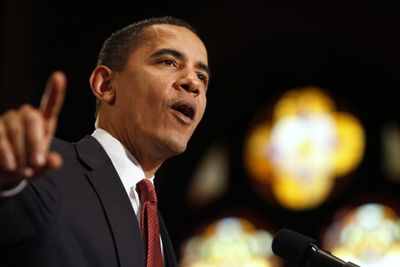Bleak numbers temper optimism from on high

WASHINGTON – The president and the Federal Reserve chairman voiced cautious optimism Tuesday that the economy could be beginning to stabilize. But the economy wasn’t cooperating.
Retail sales dropped sharply in March, the government reported, and wholesale prices fell steeply. Both pieces of data underscore the hard slog the nation faces to emerge from its deep recession and the limitations of more optimistic talk from Washington. The stock market fell 2 percent, as measured by the Standard & Poor’s 500-stock index.
President Barack Obama and Fed Chairman Ben Bernanke were hardly effusive in their comments. Obama acknowledged that “there will be more job loss, more foreclosures, and more pain” before the recession ends. But both men, in separate speeches, spoke of an end to the sense of free-fall that enveloped the U.S. economy in the final months of 2008 and first months of 2009.
Cultivating confidence
Their words reflect a new phase of the government response to the financial crisis and recession. Unlike a few months ago, the major policies meant to prop up the economy – increased government spending, special lending programs and efforts by the Fed to pump money into the economy – are now largely in place. Thus, senior officials are trying to encourage Americans to be confident about the future, so that those who still have their jobs will feel more comfortable buying a house, a car or other large items.
The administration’s actions “are starting to generate signs of economic progress,” the president said at Georgetown University, noting that some lending markets are recovering along with other sunny signs.
“This is all welcome and encouraging news,” he said.
Bernanke said that “recently we have seen tentative signs that the sharp decline in economic activity may be slowing,” noting that housing and consumer spending may be flattening. “A leveling out of economic activity is the first step toward recovery,” Bernanke told an audience at Morehouse College in Atlanta.
Their comments are consistent with an emerging consensus among those who track the economy. The pace of economic decline appears to be slowing – but the economy is still declining. There is a good chance that gross domestic product will continue shrinking, if at a milder rate, for at least one more quarter. And the job market is likely to remain poor for many months.
“A few months ago, the economy was in its deepest, darkest hours,” said Diane Swonk, chief economist of Mesirow Financial, a financial services firm. “It’s not dawn yet, but it’s better than it was. That’s what Bernanke and Obama are responding to.”
Economy reeling
And the latest economic readings Tuesday underscored that conditions remain weak. Retail sales fell 1.1 percent in March, compared with the previous month. Analysts had expected a slight gain.
The Commerce Department said that sales fell among every type of retailer except food and beverage stores. The largest decrease was at electronics and appliance stores, where sales dropped 5.9 percent. Auto sales fell 2.3 percent compared with February, while clothing stores were down 1.8 percent.
When compared with the same month last year, total March sales dropped 9.4 percent.
“It’s just telling us that consumer spending is not ready to rebound on a sustained basis,” said Patrick Newport, U.S. economist for IHS Global Insight.
Retail stocks took a beating on the news. Best Buy and Macy’s plunged 7 percent. Bed, Bath and Beyond was down 4 percent, and Target dropped 3 percent.
The financial sector fell 3.4 percent despite news that Goldman Sachs earned $1.8 billion in the first quarter and has raised $5 billion in stock to repay money it received from the federal bailout plan. Goldman stock closed down 12 percent, or $15.04, at $115.11.
Wholesale prices fell 1.2 percent in March; analysts had expected the producer price index to be unchanged. While normally decreased inflation is good news, in the current environment it is a sign that the economy is so weak that product makers have little leverage to raise prices.
That said, inflation could be more of a risk in the long run, because of the Fed’s extensive efforts to prop up the economy. In his speech, Bernanke said that the committee of Fed policymakers in charge of managing the money supply “treats its obligation to ensure price stability extremely seriously.”
“Although inflation seems set to be low for a while,” he said, “the time will come when the economy has begun to strengthen, financial markets are healing, and the demand for goods and services … begins to increase again.”